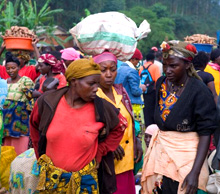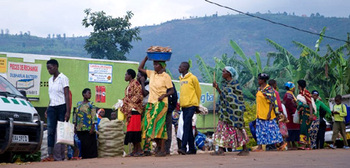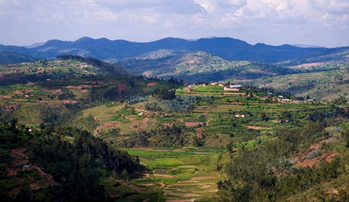Decentralisation and good governance
Project description
Title: Decentralisation and good governance in Rwanda
Commissioned by: German Federal Ministry for Economic Cooperation and Development (BMZ)
Country: Rwanda
Lead executing agency: Ministry of Local Government (MINALOC)
Overall term: 2016 to 2018

Context
Rwanda has been carrying out a comprehensive and ambitious decentralisation reform since 2000. Numerous steps have been taken towards legal, institutional and political reform, including holding local elections and the introduction of service contracts for civil servants to improve accountability. The country has already made considerable progress. Citizens have access to services in their communities, the population is able to participate in local planning and the districts have their own public funding.
Shortcomings remain, however: The roles and tasks allocated to local and national staff have not been clearly defined. Staff in the public sector lack the know-how to perform the tasks assigned to them, and the funding allocated to the districts by the central government is not sufficient to enable them to perform all their new tasks.
Objective
Districts are able to to provide public services in a needs-oriented, efficient and transparent manner with the participation of the population.

Approach
The project team has analysed and updated the catalogues of public services to enable the local authorities and municipalities to provide better services. The catalogues define the responsibilities, quality features, processes and fees for local administrative services. They constitute a basic instrument for administrative action and enable citizens to demand the relevant services.
Staff must breathe life into the content of the catalogues and receive training on how to apply this content. The project partners run campaigns and hold events to inform the population about the range of services on offer and the rights they entail.
The project team collaborates with its partners to revise local financial management laws and strategies in order to increase the revenue obtained by the districts. In addition, better transfer systems between the national government and the districts are being developed. Studies are being conducted to help the partners identify the need for reform in domestic financial management.
By providing training and advisory services on more efficient organisational procedures, the project team is assisting the Rwanda Revenue Authority in improving its work and increasing tax revenue.
Local authorities and the project team have developed new participatory methods for civic participation.
The project is training civil society organisations on topics such as participatory and gender-sensitive planning to enable them to make effective use of their options for participation.
The project has provided training in the fields of administration and services, accounting and public tenders for more than 3,000 district employees. In collaboration with the Rwandan Association of Local Government Authorities (RALGA), the project has set up the Local Government Institute (LGI), which now offers local governments a wide range of training courses for civil servants. A master's degree course on Local Governance is improving the quality of training for higher-level administrative staff and local decision-makers.
Results
Executive management staff in the district administrations have been trained to qualify their staff to provide services that meet the new quality criteria. This benefits all the citizens in the country's 30 districts. According to the results of a representative national survey from 2016, 84 per cent of the population is satisfied with the provision of public services.
The people responsible in the central government and districts are now cooperating closely to implement the fiscal decentralisation policy and strategy and are putting them into practice. The districts' own revenue increased by almost 100 per cent in the financial years 2011 to 2016. In its audits of district finances, the Office of the Auditor General now makes considerably fewer objections than in the past. While the office found fault with around 28 per cent of district expenditure in fiscal year 2011, this figure dropped to 24 per cent in fiscal year 2014.

With the help of civil society organisations, the population is now more involved in planning and monitoring local services. According to a national citizen survey conducted in 2016, 75 per cent of the population is satisfied with the opportunities for participation.